Muscle recovery is key for any fitness plan. It helps fix damage, lessen soreness, and improve performance after hard workouts. This process fills up energy, cuts down inflammation, and heals muscle wear from exercise.
Many things affect how well muscles recover, like age, gender, lifestyle, diet, workout intensity, and recovery methods. Eating the right mix of proteins, carbs, and fats is vital for muscle repair and growth.
Key Takeaways :Muscle Recovery Diet
- Proper nutrition is essential for muscle recovery and growth.
- A balanced diet with the right macronutrient ratio can enhance workout performance and recovery.
- Timing of nutrient intake is crucial for maximizing the efficiency of muscle recovery.
- Protein, carbohydrates, and healthy fats play distinct roles in the muscle recovery process.
- Incorporating pre- and post-workout nutrition strategies can significantly improve recovery and overall performance.
Understanding the Fundamentals of Muscle Recovery
Getting your muscles to recover well is key to getting the most out of your workouts. The science of muscle repair is all about balancing protein making and reducing inflammation. Good recovery not only fixes your muscles but also gets them ready for the next exercise session.
The Science Behind Muscle Repair
Muscle repair is a detailed process that involves breaking down and building up muscle fibers. When you do intense workouts, you damage your muscle tissue. Your body then fixes these damages, making your muscles bigger and stronger over time.
Key Factors Affecting Recovery Time
- Age and gender: Younger people and men recover faster than older adults and women.
- Stress levels: High stress can slow down recovery and increase inflammation.
- Sleep quality: Good sleep is vital for muscle repair and growth.
- Hydration: Drinking enough water helps remove waste and brings nutrients to muscles.
Role of Hormones in Recovery
Hormones are very important for muscle recovery. Cortisol, a stress hormone, can slow down muscle repair. On the other hand, testosterone and growth hormone help muscles grow and repair. Keeping these hormones in balance through good nutrition, managing stress, and controlling exercise intensity is crucial for recovery.
Knowing how muscle repair works and what affects recovery time can help you create a good recovery plan. By focusing on these key points, you can get the most out of your workouts and reach your fitness goals.
The Essential Components of a Muscle Recovery Diet
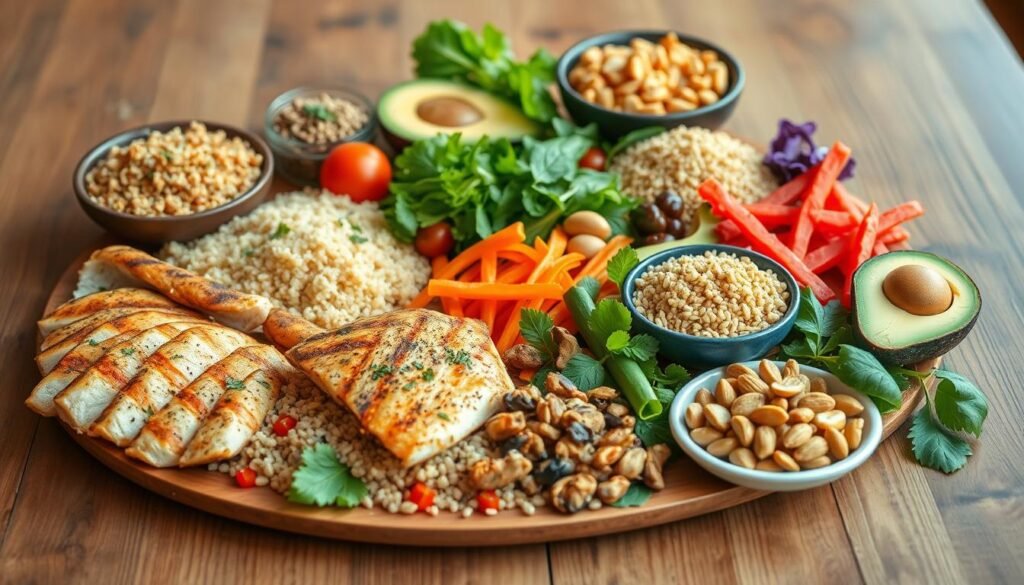
A balanced diet is key for muscle recovery. It must have the right mix of macronutrients, micronutrients, and hydration. This diet helps the body heal and grow muscles, improving your athletic performance.
Macronutrients for Muscle Repair
Protein is vital for muscle repair. It helps fix and grow muscle fibers. Aim for about 1.6 grams of protein per kilogram of body weight daily for muscle growth.
Carbohydrates are also important. They refill energy and help nutrients reach muscles. Eating carbs and protein after working out boosts muscle repair and performance.
Healthy fats, like those in nuts, seeds, and fatty fish, are good for muscle health. They provide essential fatty acids. A balanced diet with these macronutrients helps muscles recover well.
Micronutrients for Muscle Recovery
- Vitamins and minerals like vitamin C, zinc, and magnesium are crucial for muscle repair and inflammation.
- Antioxidants in fruits and vegetables reduce muscle damage from exercise.
- Supplements like cherry juice and creatine can help with muscle recovery when used with exercise.
Hydration for Optimal Recovery
Drinking enough water is vital for muscle recovery. Aim to drink 1.5 liters of water for every kilogram of body weight lost during exercise. This prevents dehydration and supports healing.
Focus on a diet rich in nutrients, including macronutrients, micronutrients, and hydration. This diet supports muscle recovery and growth, leading to better athletic performance.
Protein Requirements for Optimal Recovery
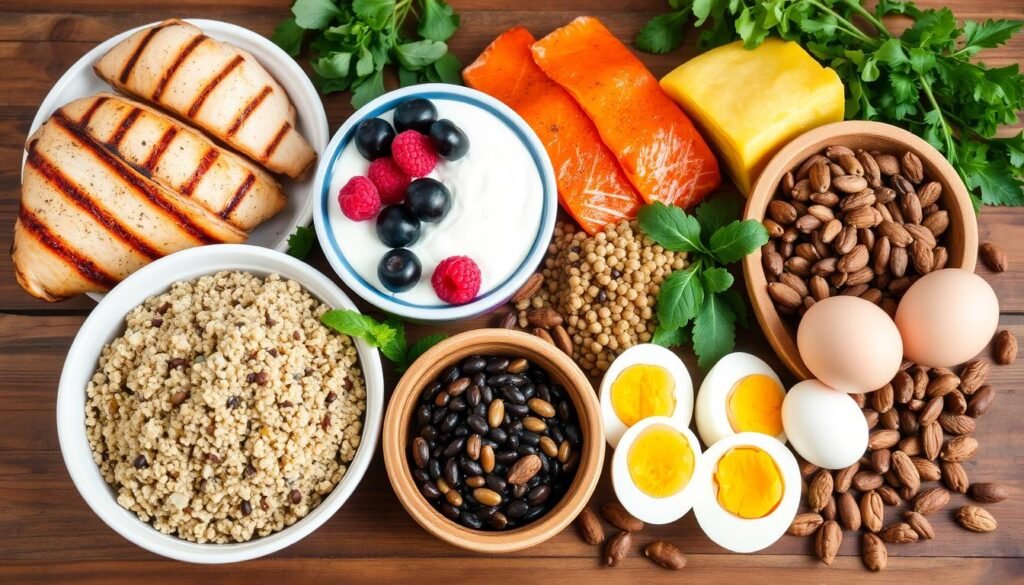
Protein is key for fixing and growing muscles. It’s a must-have in any muscle recovery diet. Knowing about complete and incomplete proteins and when and where to get them is vital for recovery.
Complete vs. Incomplete Proteins
Complete proteins have all the amino acids muscles need. Incomplete proteins are missing some. For best muscle recovery, choose complete protein sources like lean meats, fish, eggs, dairy, and soy.
Timing Your Protein Intake
Eating protein within 30 minutes to an hour after working out is crucial. Aim for 20-30 grams of high-quality protein. This helps start the muscle repair and growth process.
Best Protein Sources for Recovery
Not all proteins are the same for muscle recovery. Some top choices include:
- Lean meats (chicken, turkey, lean beef)
- Fish (salmon, tuna, tilapia)
- Eggs
- Dairy products (Greek yogurt, cottage cheese)
- Plant-based proteins (soy, legumes, quinoa)
These foods are rich in protein and amino acids. They help your muscles recover and get stronger.
Adding a variety of lean proteins to your meals and snacks is important. It helps meet your body’s protein needs during recovery.
Strategic Carbohydrate Consumption
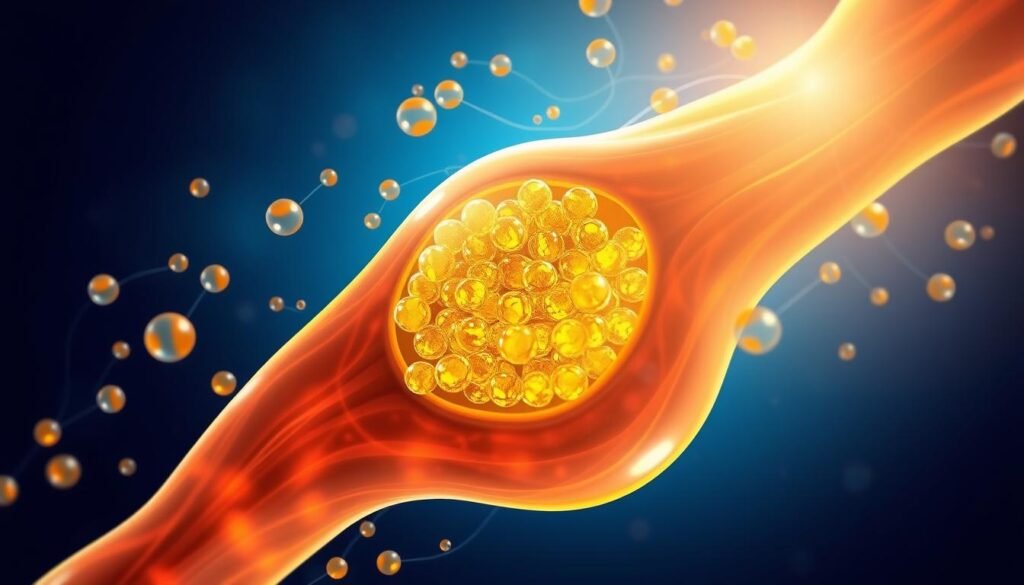
Carbohydrates are key for muscle recovery. They help refill glycogen stores and give your body the energy it needs to heal. After a tough workout, eating carbs wisely is crucial to get the most from your training.
Top athletes aim to eat lots of carbs during training, races, and rest. They burn most of their glycogen in 60-90 minutes of hard exercise. It can take 18-24 hours to fully recover glycogen if it’s all used up.
To best refill glycogen, experts say eat 1-1.2 grams of carbs per kilogram of body weight every hour for the first 4 hours of rest. You can get these carbs from complex carbohydrates like whole grains, fruits, and veggies.
When to eat carbs matters a lot for muscle recovery. Eating carbs within 30 minutes to an hour after working out helps restore glycogen quickly. This is the best time for glycogen replenishment and energy restoration.
| Post-Workout Meal/Snack | Carbohydrate Content (approx.) |
|---|---|
| 250g cooked pasta with tomato sauce | 70g |
| Medium jacket potato and half a can of baked beans | 70g |
| 3 slices of white bread with jam or honey, and a banana | 70g |
| Blueberry muffin or flapjack | 70g |
| Recovery shake | 70g |
| 5 scoops of Carb Only Drink Mix | 70g |
Eating the right carbs after your workout helps refill glycogen and aids in recovery. This boosts your performance for the next training or competition.
Healthy Fats and Their Role in Recovery
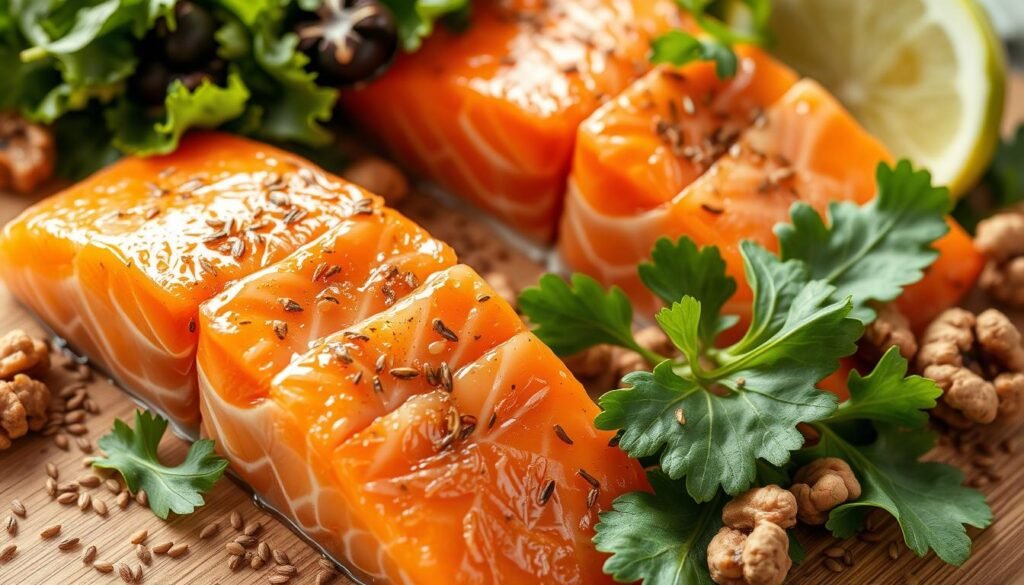
Healthy fats are key for muscle recovery and health. They support hormone production, cell function, and reduce inflammation. These are important for fixing and growing muscles.
Essential Fatty Acids for Muscle Health
Omega-3s are great for muscle health. You can find them in fatty fish like salmon, sardines, and mackerel. They help reduce inflammation and speed up muscle recovery.
Eating foods rich in omega-3s or taking supplements can help athletes and active people a lot.
Optimal Fat Sources
- Avocados
- Nuts and seeds (almonds, walnuts, chia, flax)
- Fatty fish (salmon, sardines, mackerel)
- Olive oil
Choose whole foods like avocados, nuts, seeds, fatty fish, and olive oil for unsaturated fats. Avoid saturated fats in animal products. Also, limit trans fats to avoid inflammation and health issues.
Daily Fat Intake Guidelines
Athletes and active people should aim for 20-35% of their calories from fat. Focus on omega-3 fatty acids, anti-inflammatory fats, and unsaturated fats. This helps with muscle recovery, reduces inflammation, and boosts health and performance.
“Incorporating omega-3 fatty acids into your diet can provide significant benefits for athletes and active individuals, helping to reduce inflammation and enhance muscle recovery and remodeling.”
| Fat Source | Benefits for Muscle Recovery |
|---|---|
| Salmon | Rich in omega-3 fatty acids, which reduce inflammation and support muscle repair |
| Avocado | High in monounsaturated fats, promoting healthy cell function and reducing oxidative stress |
| Almonds | Contain unsaturated fats and antioxidants that may aid muscle recovery |
Pre and Post-Workout Nutrition Strategies
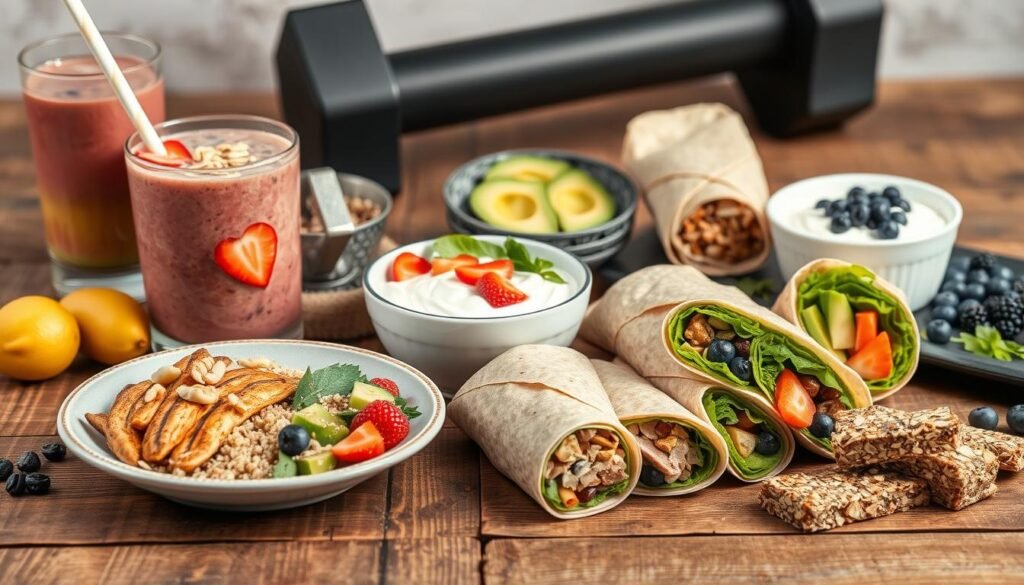
Timing your nutrients is key for energy before and recovery after a workout. Plan your meals before and after to boost your performance and help muscles heal.
Fueling Up Before a Workout
It’s smart to eat 1 to 4 hours before exercising. Choose foods high in carbs and some protein. Think oatmeal with fruit, whole-grain toast with peanut butter, or yogurt with berries. This gives your muscles the energy they need.
Refueling After a Workout
Drink a mix of protein and carbs within 30 to 60 minutes after. A 3:1 ratio is best for muscle repair and energy. Try a protein shake with banana, Greek yogurt with berries, or a turkey and avocado sandwich.
Staying Hydrated
Drinking water is vital before, during, and after exercise. Aim for 2 to 3 cups before, 1/2 to 1 cup every 15 to 20 minutes during, and 2 to 3 cups after. For long, intense workouts, use sports drinks to keep electrolytes balanced and add carbs for energy.
By planning your nutrient timing, energy fueling, and recovery meal planning, you’ll get the most from your workouts. This supports muscle recovery and growth.
Also Read : 7 Quick Weight Loss Diet Tips That Actually Work!
Conclusion
A good muscle recovery diet is key for top performance and muscle growth. Make sure to eat enough protein, carbs, and healthy fats. Eat whole foods, drink plenty of water, and think about what you eat before and after working out.
Everyone’s needs are different, so listen to your body and adjust your diet. Talk to a registered dietitian or nutritionist for advice on your balanced recovery diet. Following these tips can help you recover better and perform better.
Good nutrition, staying hydrated, and tailoring your recovery are vital for your athletic journey. Stay committed, keep learning, and let your body show you the way to better muscle recovery and growth.
FAQs
Q: What are the best foods for muscle recovery?
A: The best muscle recovery foods include lean proteins such as chicken, fish, and legumes, complex carbohydrates like whole grains and sweet potatoes, and healthy fats from sources like avocados and nuts. These foods aid in muscle recovery by promoting muscle protein synthesis and replenishing muscle glycogen.
Q: How can I optimize my post-workout recovery?
A: To optimize your post-workout recovery, focus on consuming a balanced meal that includes both protein and carbohydrates within 30 to 60 minutes after exercise. This helps to promote muscle recovery and reduce soreness, ensuring your body gets the nutrients it needs to repair and rebuild.
Q: What foods should I avoid during my muscle recovery diet?
A: Foods to avoid during your muscle recovery diet include processed sugars, high-fat junk foods, and alcohol. These can hinder muscle recovery, exacerbate muscle soreness, and negatively impact muscle function and overall sports nutrition.
Q: What is the role of protein in muscle recovery?
A: Protein plays a crucial role in muscle recovery by facilitating muscle protein synthesis, which is essential for repairing exercise-induced muscle damage and promoting muscle building. Consuming adequate protein after workouts helps your body recover more effectively.
Q: Can I eat carbs for muscle recovery?
A: Yes, eating carbohydrates is vital for muscle recovery as they replenish muscle glycogen stores depleted during exercise. Including complex carbs in your diet ensures you have enough energy for recovery and future workouts.
Q: What are some examples of post-workout meals?
A: Examples of great post-workout meals include a smoothie with protein powder, banana, and spinach; a grilled chicken breast with quinoa and vegetables; or a tuna salad with whole-grain bread. These meals contain the right foods to promote muscle recovery.
Q: How does hydration affect muscle recovery?
A: Hydration is critical for optimal muscle recovery as it helps maintain muscle function and aids in nutrient transportation. Drinking enough fluids before, during, and after exercise can help reduce soreness and enhance your body’s recovery process.
Q: What are the 10 best muscle recovery foods?
A: The 10 best muscle recovery foods include salmon, chicken, Greek yogurt, eggs, quinoa, sweet potatoes, spinach, berries, nuts, and legumes. Incorporating these foods into your diet can significantly enhance post-exercise muscle recovery.
Q: How important is timing for post-exercise recovery?
A: Timing is crucial for post-exercise recovery. Consuming a meal or snack rich in protein and carbs shortly after your workout (ideally within 30 minutes) can help maximize muscle recovery and minimize delayed onset muscle soreness.
Source Links
- https://www.health.com/nutrition/muscle-recovery-foods
- https://www.ewmotiontherapy.com/blog/eat-for-muscle-recovery
- https://www.healthline.com/nutrition/eat-after-workout
- https://ketone.com/blogs/blog/training-muscle-recovery-essential-to-your-next-workout?srsltid=AfmBOooXSZ6dmpc8JESI_HVNvAxVQFftLi0JjnrlbWy7oNYrpVM4qZe4
- https://wearechief.com/blogs/articles/recovery-fundamentals?srsltid=AfmBOoo4DafRfasmo6DPeQFFxkEtmGftjontZWDcJeN1DaGsWE11zL8c
- https://pmc.ncbi.nlm.nih.gov/articles/PMC7909540/
- https://pmc.ncbi.nlm.nih.gov/articles/PMC9736198/
- https://www.healthline.com/health/muscle-recovery
- https://www.acsm.org/docs/default-source/files-for-resource-library/protein-intake-for-optimal-muscle-maintenance.pdf
- https://www.massgeneralbrigham.org/en/about/newsroom/articles/how-much-protein-when-working-out
- https://pmc.ncbi.nlm.nih.gov/articles/PMC5852800/
- https://www.precisionhydration.com/performance-advice/nutrition/should-you-use-carbohydrates-or-protein-for-recovery/
- https://pmc.ncbi.nlm.nih.gov/articles/PMC7796021/
- https://pmc.ncbi.nlm.nih.gov/articles/PMC8878406/
- https://run.outsideonline.com/nutrition-and-health/training-nutrition/omega-3-fats-for-muscle-recovery/
- https://pmc.ncbi.nlm.nih.gov/articles/PMC7070550/
- https://pmc.ncbi.nlm.nih.gov/articles/PMC3905293/
- https://www.eatright.org/fitness/physical-activity/exercise-nutrition/timing-your-pre-and-post-workout-nutrition
- https://www.heart.org/en/healthy-living/healthy-eating/eat-smart/nutrition-basics/food-as-fuel-before-during-and-after-workouts
- https://www.mayoclinic.org/healthy-lifestyle/fitness/in-depth/exercise/art-20045506
- https://pmc.ncbi.nlm.nih.gov/articles/PMC9230724/
- https://www.verywellhealth.com/nutrition-and-supplements-for-muscle-recovery-8374467
- https://quanutrition.com/blog/nutrition-for-muscle-recovery/



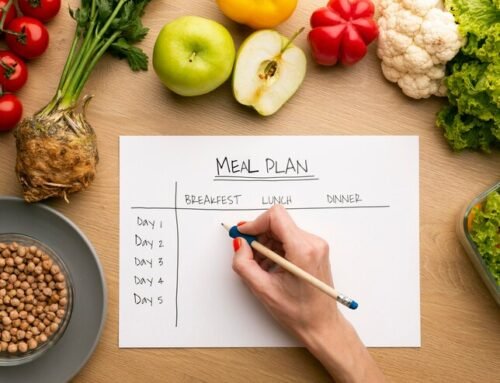




Leave A Comment